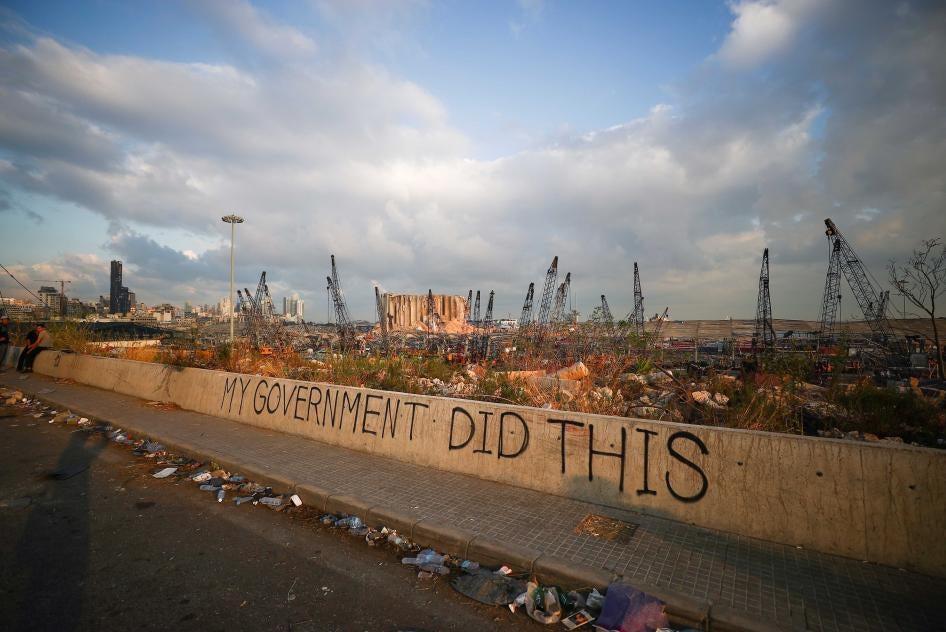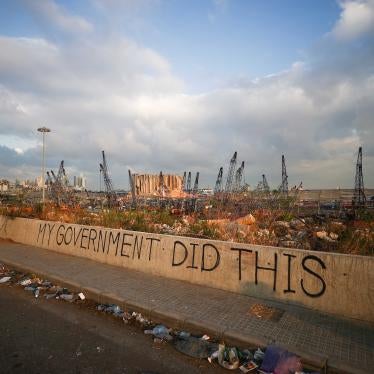(Beirut) – Lebanon’s general prosecutor on January 25, 2023, ordered the release of all suspects detained in connection with the catastrophic explosion in Beirut’s port on August 4, 2020, Human Rights Watch and Amnesty International said today. The unprecedented move amid rampant political interference bypasses the ongoing criminal investigation into the explosion.
To help secure a path toward truth and justice for the victims, the United Nations Human Rights Council should urgently pass a resolution to create an impartial fact-finding mission into the Beirut port explosion.
“Lebanon may be leaderless, but that doesn’t mean other countries cannot step up to lead on human rights for people in Lebanon,” said Lama Fakih, Middle East director at Human Rights Watch. “The gross failure to provide justice to the victims of the Beirut port explosion will only further undermine stability and the rule of law at this critical juncture in Lebanon’s history.”
Nearly two-and-a-half years on, the domestic investigation has stagnated with no progress in sight due to multiple legal challenges from the politicians charged in the case aiming to replace the lead investigator, Judge Tarek Bitar.
On January 23, Judge Bitar took steps to overcome the stalled investigation. Relying on a legal analysis, he said that the rules governing the dismissal of judges outlined under article 357 of Law 328 did not apply to his role and that attempts to dismiss him amounted to a breach of the constitutional principle of separation of powers.
In resuming his work, he ordered the release of five suspects detained between August 2020 and September 2021 and charged others. He summoned Ghassan Oweidat, the general prosecutor; Abbas Ibrahim, director general of general security; Tony Saliba, director general of state security; Jean Kahwaji, the former army chief; Jawdat Oweidat and Kamil Daher, former intelligence officers; Asaad Tufayli, head of the Higher Customs Council; Gracia Al-Azzi, a Higher Customs Council member; and judges Ghassan Khoury, Carla Shawah, and Jad Maalouf for interrogation.
In response, Judge Oweidat, whom Judge Bitar had charged, indicated that law enforcement agencies would not execute Bitar’s orders, considering them “null.” The justice minister sent Judge Bitar’s legal analysis to the Higher Judicial Council for review, alleging it may impact the “secrecy of the investigation.”
Judge Oweidat then ordered the release of all of the detainees in the Beirut blast case, noting that the investigation has been stalled for over a year, and citing the right to a speedy trial under international law. Bitar told local Lebanese media that “security forces’ enforcement of the state prosecutor’s order to release the detainees will be a coup against the law.” Hours after the general prosecutor’s order, security forces began releasing the 17 detainees held in connection to the blast.
The General Prosecutor also charged Judge Bitar with several crimes, including “usurping power,” imposed a travel ban on him, and summoned him for questioning on January 26.
The Lebanese authorities have repeatedly obstructed the domestic investigation into the explosion by shielding politicians and officials implicated in the explosion from questioning, prosecution, and arrest. Human Rights Watch, Amnesty International, Legal Action Worldwide, Legal Agenda, and the International Commission of Jurists have documented a range of procedural and systemic flaws in the domestic investigation, including flagrant political interference, immunity for high-level political officials, lack of respect for the fair trial standards, and due process violations.
The politicians suspected in the case have filed over 25 requests to dismiss Judge Bitar, and other judges involved in the case, causing the inquiry to be repeatedly suspended while the cases are adjudicated. The latest series of legal challenges filed against Judge Bitar resulted in the suspension of the investigation on December 23, 2021.
The Human Rights Council should pass a resolution that would establish and dispatch, without delay, an independent and impartial fact-finding mission for the Beirut explosion. The mission should establish the facts and circumstances, including the root causes, of the explosion, with a view to establishing state and individual responsibility and supporting justice and reparations for the victims.
The explosion at Beirut’s port was one of the largest non-nuclear explosions in global history. The explosion sent shock waves through the city, killing at least 220 people, wounding over 7,000, and causing extensive property damage. An in-depth investigation by Human Rights Watch points to the potential involvement of foreign-owned companies, as well as senior political and security officials in Lebanon.
The Beirut explosion was a tragedy of historic proportions, arising from the failure to protect the fundamental right to life.
“We are in shock,” Mireille Khoury, mother of Elias Khoury, who was killed by the explosion at the age of 15, told the organizations. “In what state are we living? All this proves that the international investigation is our only hope and that the HRC [Human Rights Council] is our main route. When will the leaders of the world open their eyes to this horrendous injustice against us?”
It is now clearer than ever that the domestic investigation will not be allowed to progress and cannot deliver justice, making the establishment of an international fact-finding mission mandated by the UN Human Rights Council all the more urgent, the organizations said.
The survivors of the explosion and the families of the victims have previously sent two letters to the member and observer states of the Human Rights Council urging them to support a resolution establishing an international investigation. They sent another letter to the high commissioner for human rights in March 2022.
More than 162 Lebanese and international rights groups, survivors, and families of the victims have called on the Human Rights Council members to put forward such a resolution. Dozens of Lebanese parliament members and three political parties have supported calls from victims’ families and civil society for an investigation.
“The Lebanese authorities have run roughshod over the law, shamelessly bypassing an ongoing criminal investigation and retaliating against a judge who was just doing his job,” said Aya Majzoub, deputy Middle East and North Africa director at Amnesty International. “It is patently clear that the Lebanese authorities are determined to obstruct justice. Since the explosion, they have repeatedly blocked the domestic investigation, shielding themselves from accountability at the expense of the victims’ rights to truth, justice, and redress.”







